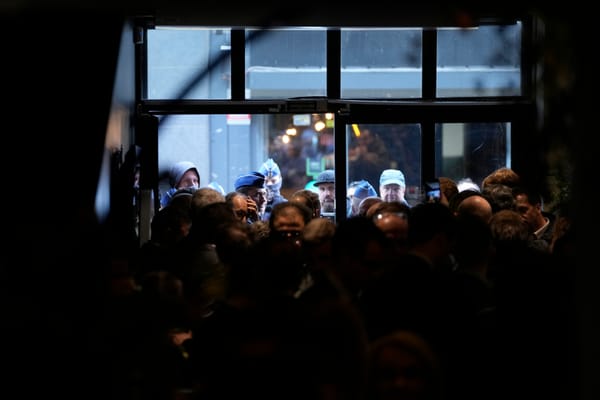It was unexpected, but we weren’t surprised when it happened. I am speaking of the attempt to shut down the National Conservatism conference that took place in Brussels last week. The trouble started when the manager of the venue reserved for the occasion—the Concert Noble—canceled the booking a few days before the event. The Concert Noble is an aesthetically impressive piece of architecture dating from the late 18th century, perfectly harmonizing with the conservative temperament. The reason for the withdrawal was the relentless pressure exerted by Philippe Close, the Socialist mayor of Brussels. The organizers found another venue, the Sofitel Hotel. But then, one day before the conference, the hotel manager also withdrew, claiming that guests staying at the hotel had told him that they would never stay there again if the conference went forward. Miraculously, at the last moment, the organizers found the third venue, the Claridge Events Centre, owned by a Belgian-Tunisian businessman.
The conference started at about 9 a.m. Before noon, the local police had surrounded the building, this time at the order of the mayor of the district of Saint-Josse-ten-Noode, Emir Kir, another Socialist. The police attempted to enter the building but retreated, seeing many cameras trained on them. The conference continued, but the police didn’t allow anyone to enter and, for some time, blocked the caterers, apparently to enforce the mayor’s will by starving the participants; the venue’s courageous owner and his wife received threats.
After a couple of hours, Belgium’s prime minister, Alexander de Croo, made a statement in which he called the mayors’ action against the National Conservatives “unacceptable” and “unconstitutional.” De Croo’s statement didn’t change much on the ground, however. The participants who wanted to join the conference continued to be blocked by the police. The policemen argued—quite rightly—that what the prime minister said was his personal opinion and not an administrative decision. The blockade ended when, in the late evening hours, the Belgian administrative court invalidated the ban.
The incident encapsulates much of what is wrong in the West today. To put it simply, no principle generally proclaimed to be sacred is really sacred. Freedom of assembly, freedom of speech, the sanctity of privacy—the rules to which the European elites unceasingly pay lip service—don’t count. When it comes to fighting conservatives, the principles can be easily suspended or ignored. The European Parliament didn’t react to the incident, although several of its members were among those whose freedoms had been violated. Belgium’s prime minister satisfied himself with a statement of mild indignation but did nothing practical to change the situation. I heard of no protests from mainstream institutions and organizations. Needless to say, such protests would have undoubtedly exploded throughout Europe if the victims were liberals, socialists, environmentalists, LGBT activists, or other left-wing groups.
“For those of us who remember Soviet totalitarianism, it was a déjà vu.”
For those of us who remember Soviet totalitarianism, it was a déjà vu. Three things in particular seemed familiar. First, one was confronted with a coercive force that indubitably violated the law, and there was very little one could do about it. Some participants described the sense of helplessness they felt when they couldn’t enter the building to attend the conference. They had grown to believe such a development was simply impossible in today’s Europe, but all of a sudden, this impossibility became a fact. This feeling of helplessness increased when they realized that the lawlessness wasn’t the work of a single individual or group of individuals—but an entire system.
The second type of déjà vu was the realization of the extent to which our world is shaped by relentless propaganda. One couldn’t help but be struck by a contrast between the rather civilized, even genteel character of the conference and the sinister language in which the political mainstream described it—“far right,” “fascist,” etc. This shows how hard the mainstream works to shape the minds of the populace and to implant in them a sense of the enemy. People who succumb to this conditioning are incapable of perceiving the complexity of the world as it is, let alone of communicating with those who think differently. Their natural reaction is not to think but to fight the baddies.
The third type of déjà vu had to do with how a despotic or semi-despotic system reveals moral character (and lack thereof). To host the National Conservatism conference required courage, and the owner of the third venue proved to be a courageous man. On the other hand, it was most disquieting to see how little it takes to expose a coward. Cowards will always find an excuse for failing to act decently and hide their fear behind clumsy arguments. In a society that has increasingly busied itself with tracking down enemies, fear is on the rise, and so is cowardly behavior.
